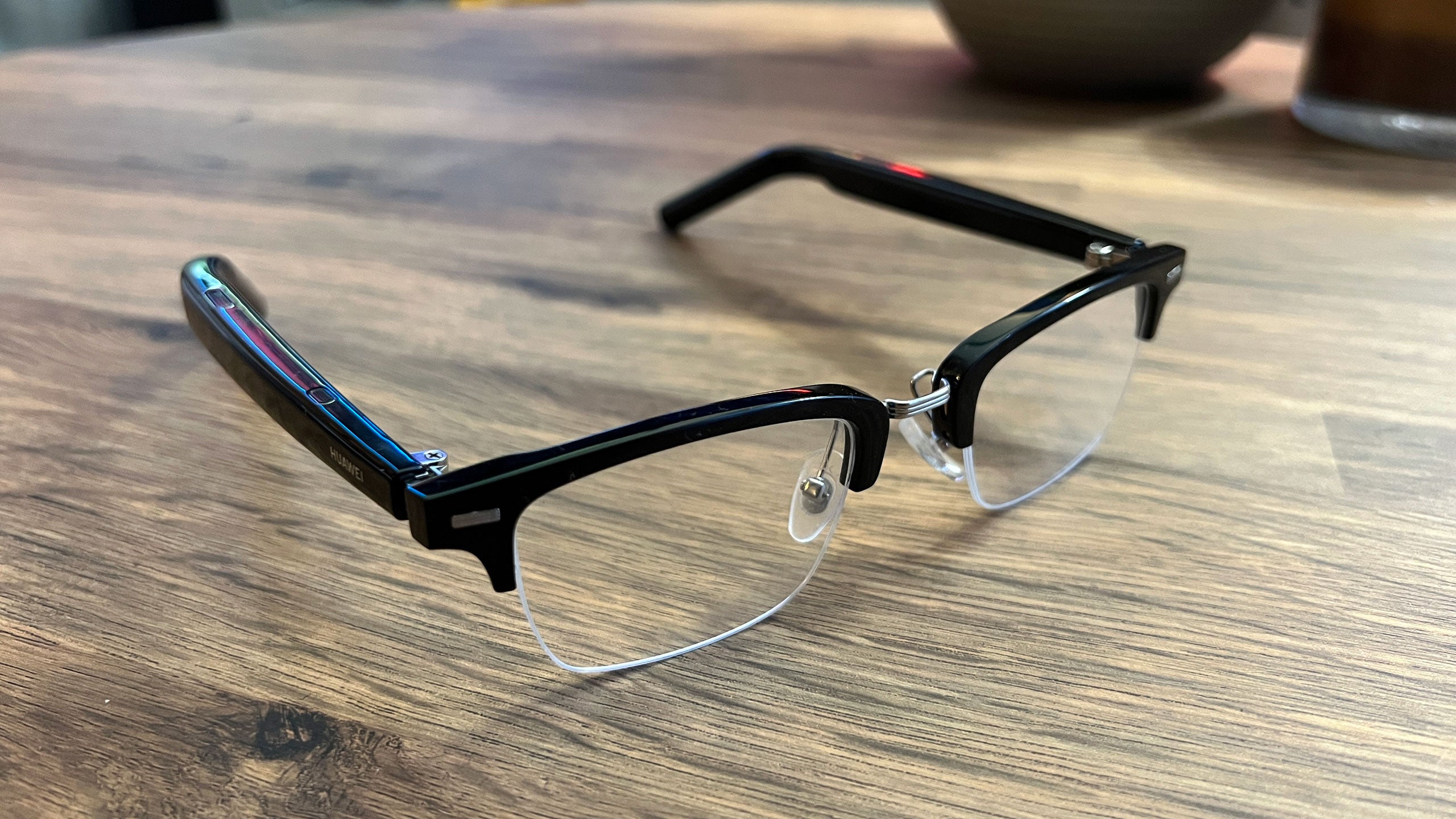Ray-Ban Meta Glasses Review
The best-looking and most capable smart specs around right now.


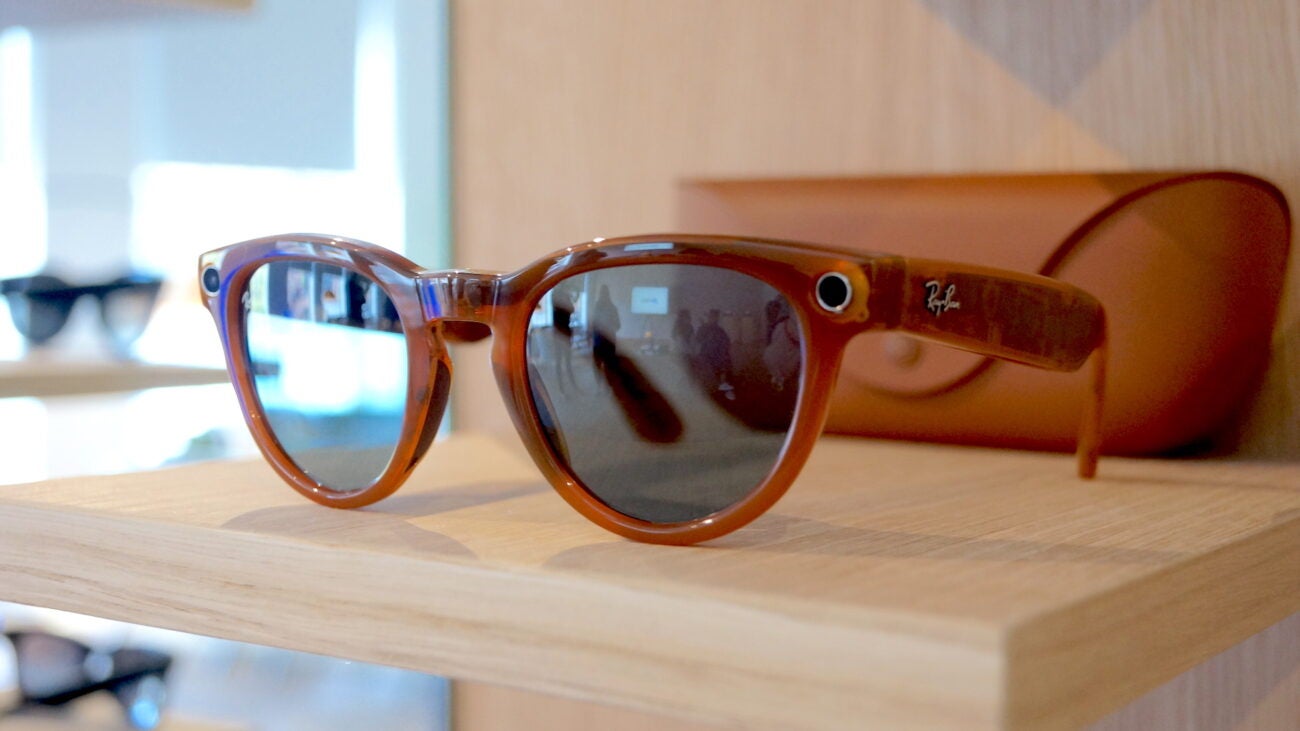

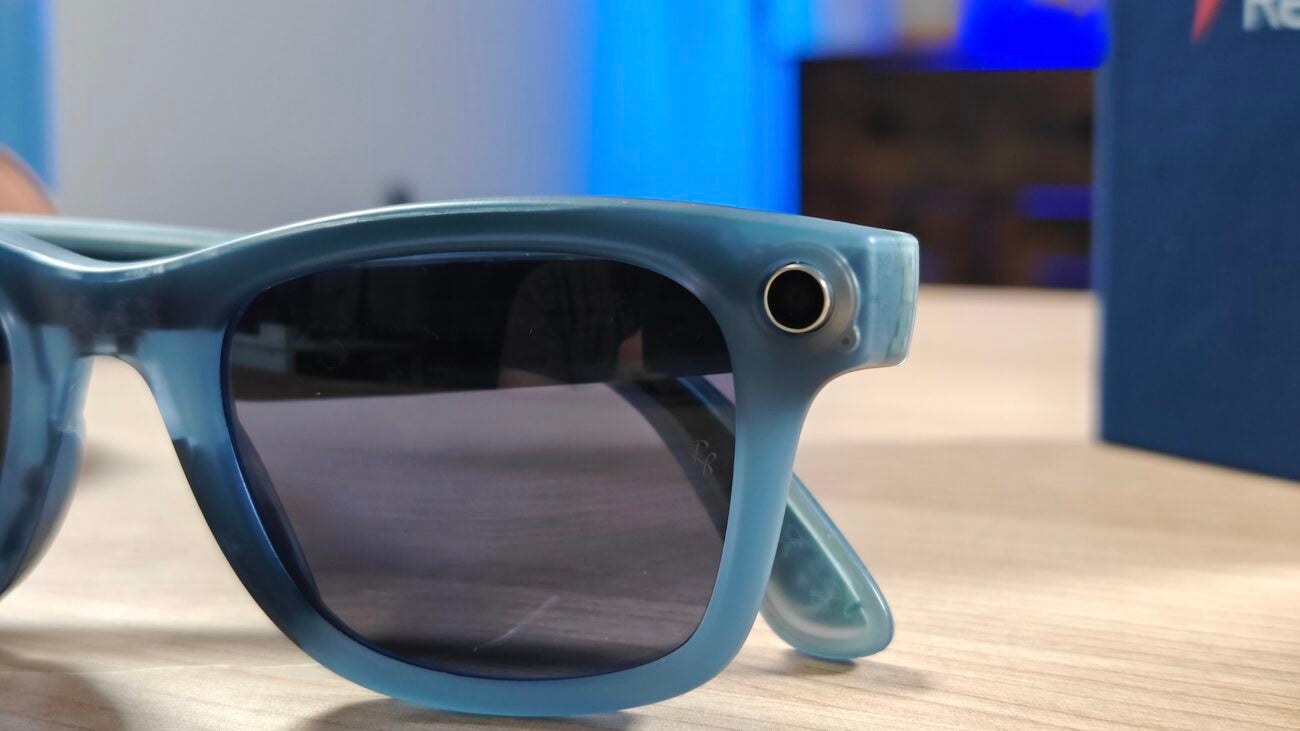

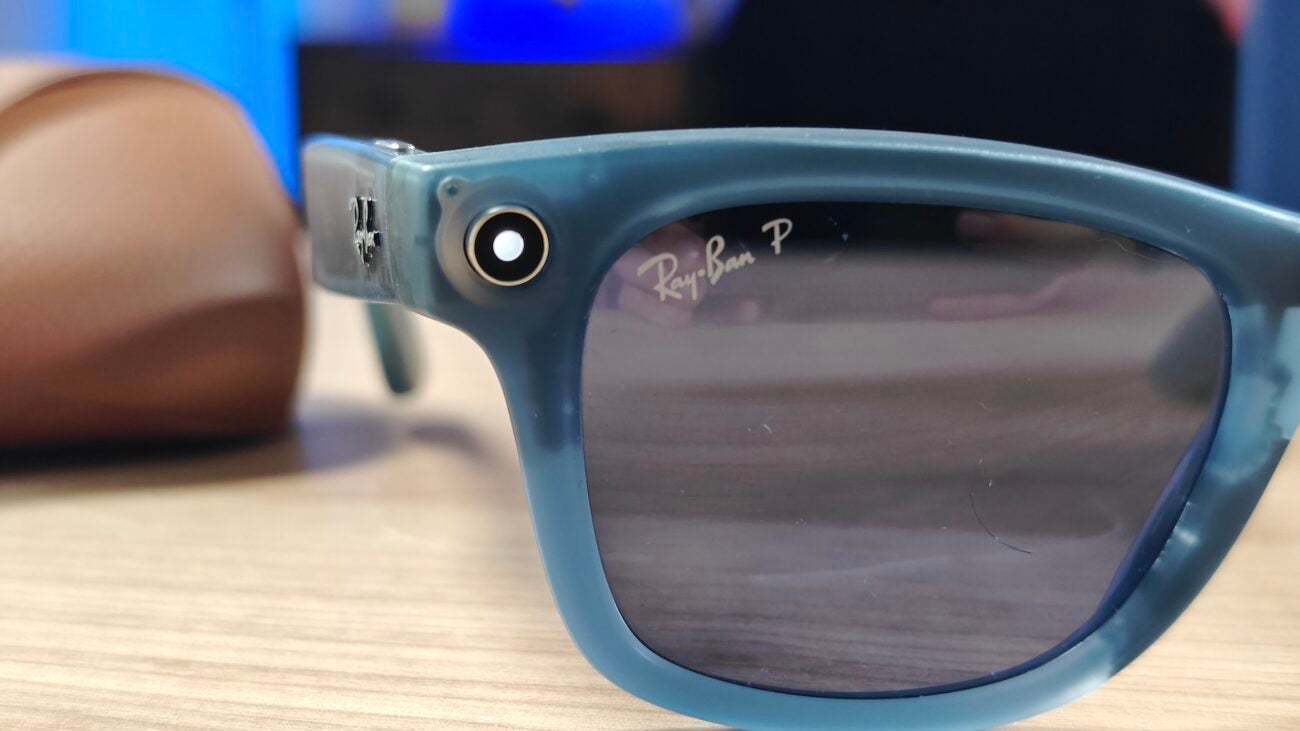
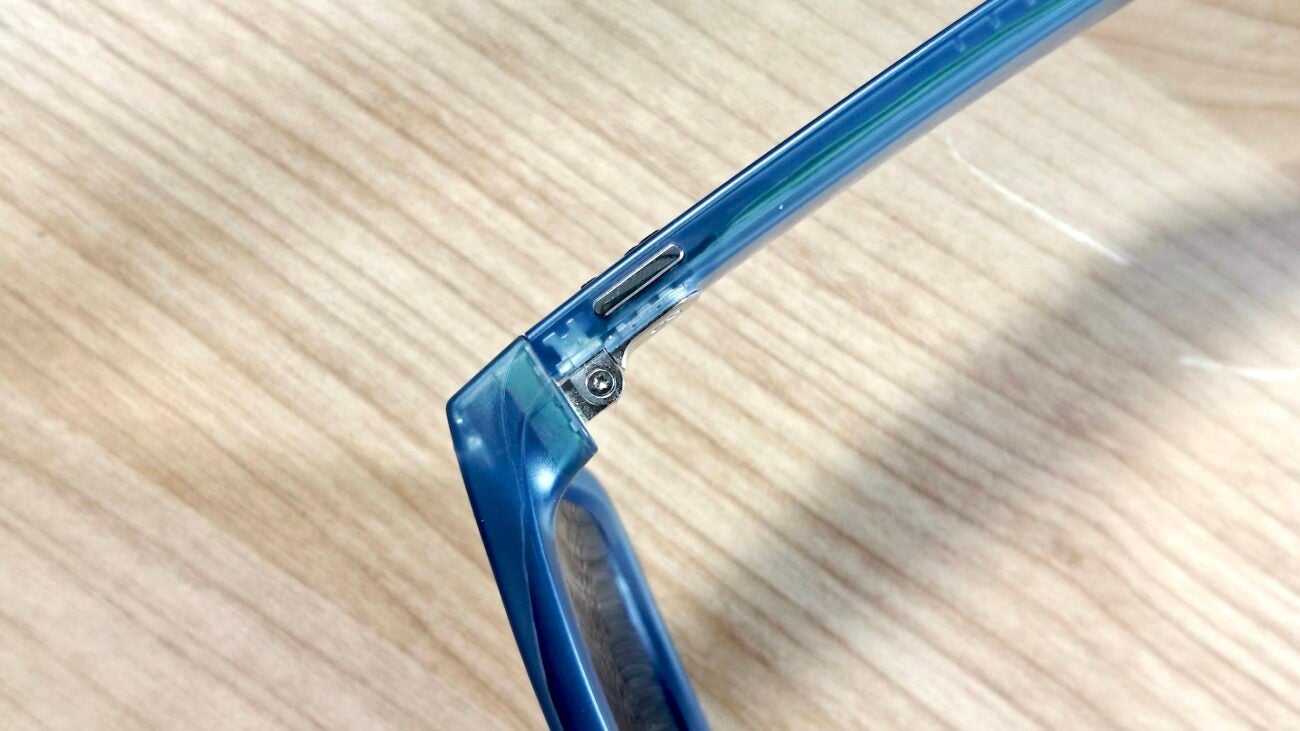

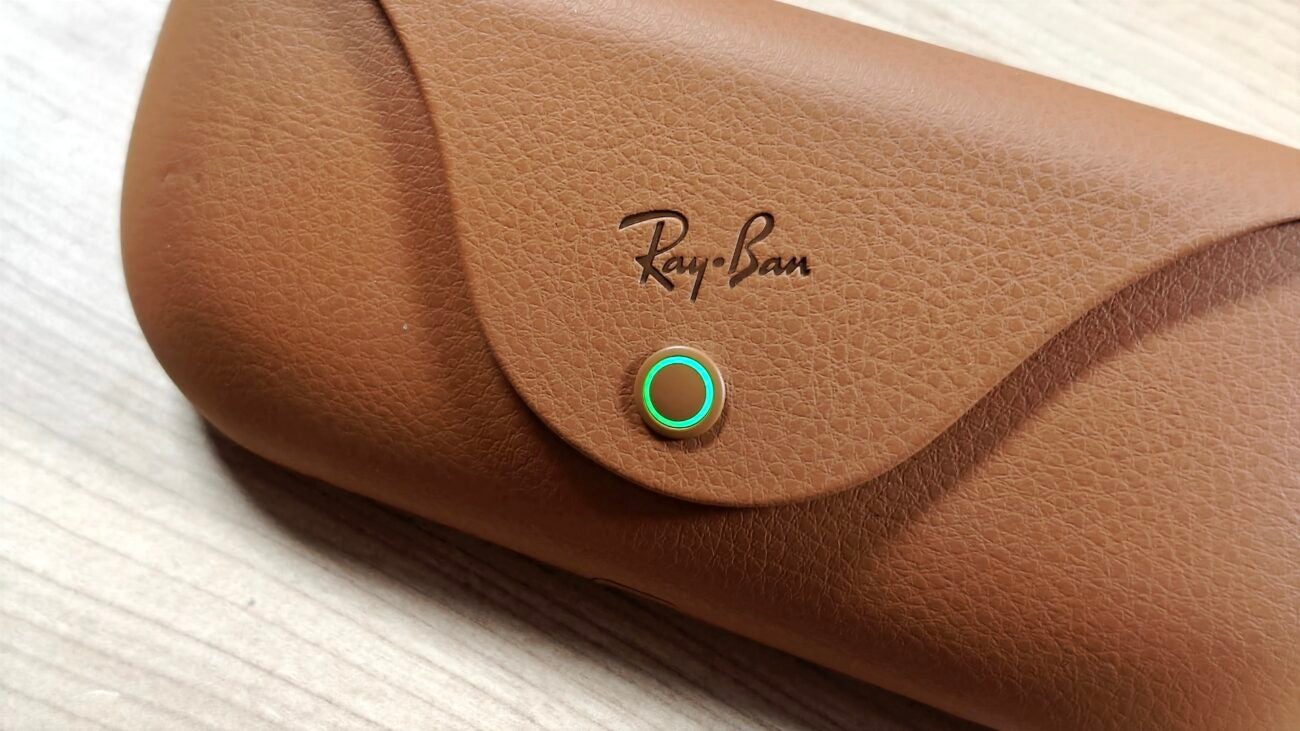
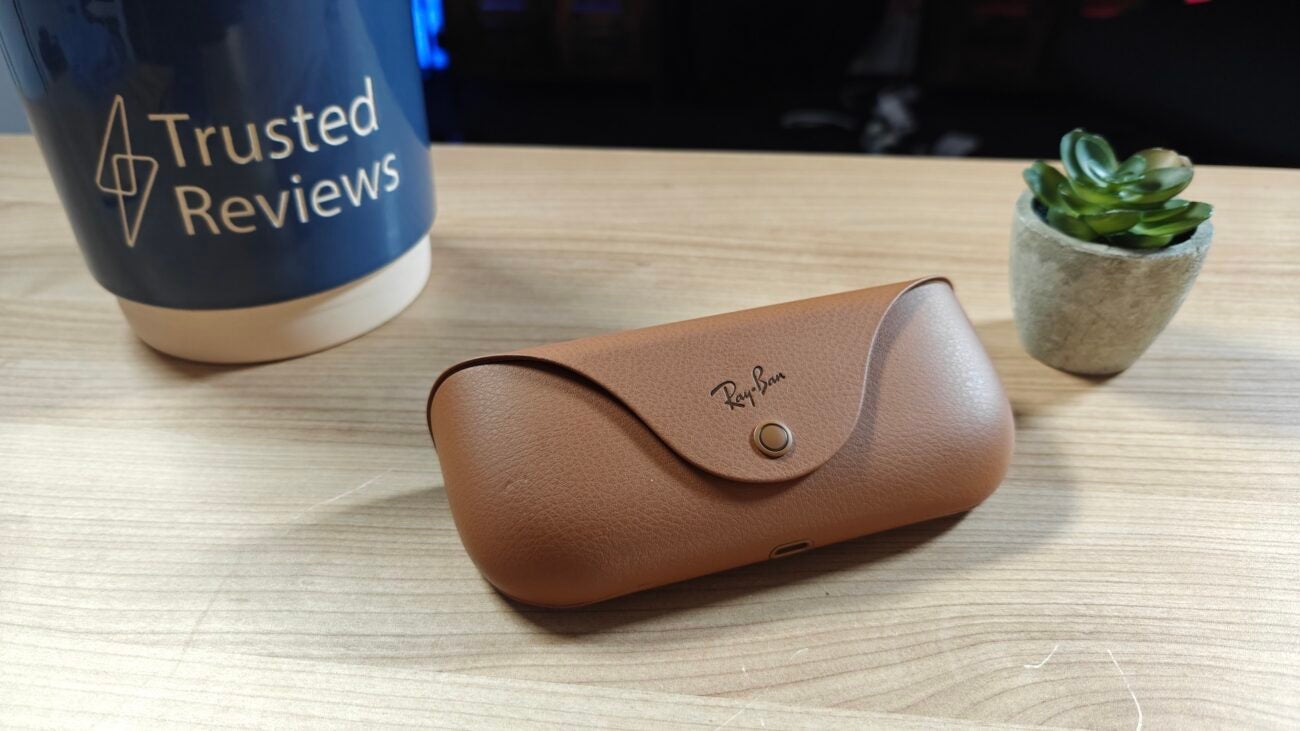

Verdict
The Ray-Ban Meta Glasses remain a niche in the tech world, but if you’re after a smart pair of sunglasses that can take photos and videos, deliver decent audio playback and provide handy AI capabilities, they remain one of the best options available right now.
Pros
- Stylish and comfortable to wear
- Genuinely useful AI smarts
- Much-improved photo and video capture
Cons
- App sync issues
- No dust protection
- Low-light images look noisy and soft
Key Features
- Video captureWith a 12MP camera, the glasses can take both photos and record 1080p video.
- Open ear speakersAllows you to listen to audio from the glasses, without blocking your ear canals.
- Charging caseBattery is replenished via the bundled charging case, providing up to 8 additional charges on the go.
Introduction
Following a partnership that first started in 2020, Meta and EssilorLuxottica (the company behind Ray-Ban) have revealed their second-gen smart glasses dubbed the (not-so-catchy) Ray-Ban Meta Glasses – and they’re available to buy worldwide now.
Designed as a follow-up to the Ray-Ban Stories, the camera-equipped smart glasses boast a range of improvements from an upgraded 12MP camera to louder, more bassy audio output, new smart features and, importantly, a much more comfortable design.
Though they’re a far cry from the AR glasses of tomorrow, there’s still a lot to like about the £299/$299 Ray-Ban Meta Glasses, whether you’re a fashion-conscious content creator or someone who simply wants to live the ultimate James Bond spy tech dream.
Design
- Signature Ray-Ban design
- New Headliner style
- Semi-transparent finish
As a product of a collaboration with stylish glasses maker Ray-Ban, it should come as no surprise that the new Ray-Ban Meta Glasses come in the brand’s signature big-lens Wayfarer style. But what is new to this year’s collection – and Ray-Ban in general – is the Headliner style, with a more rounded shape and high-hinge design.
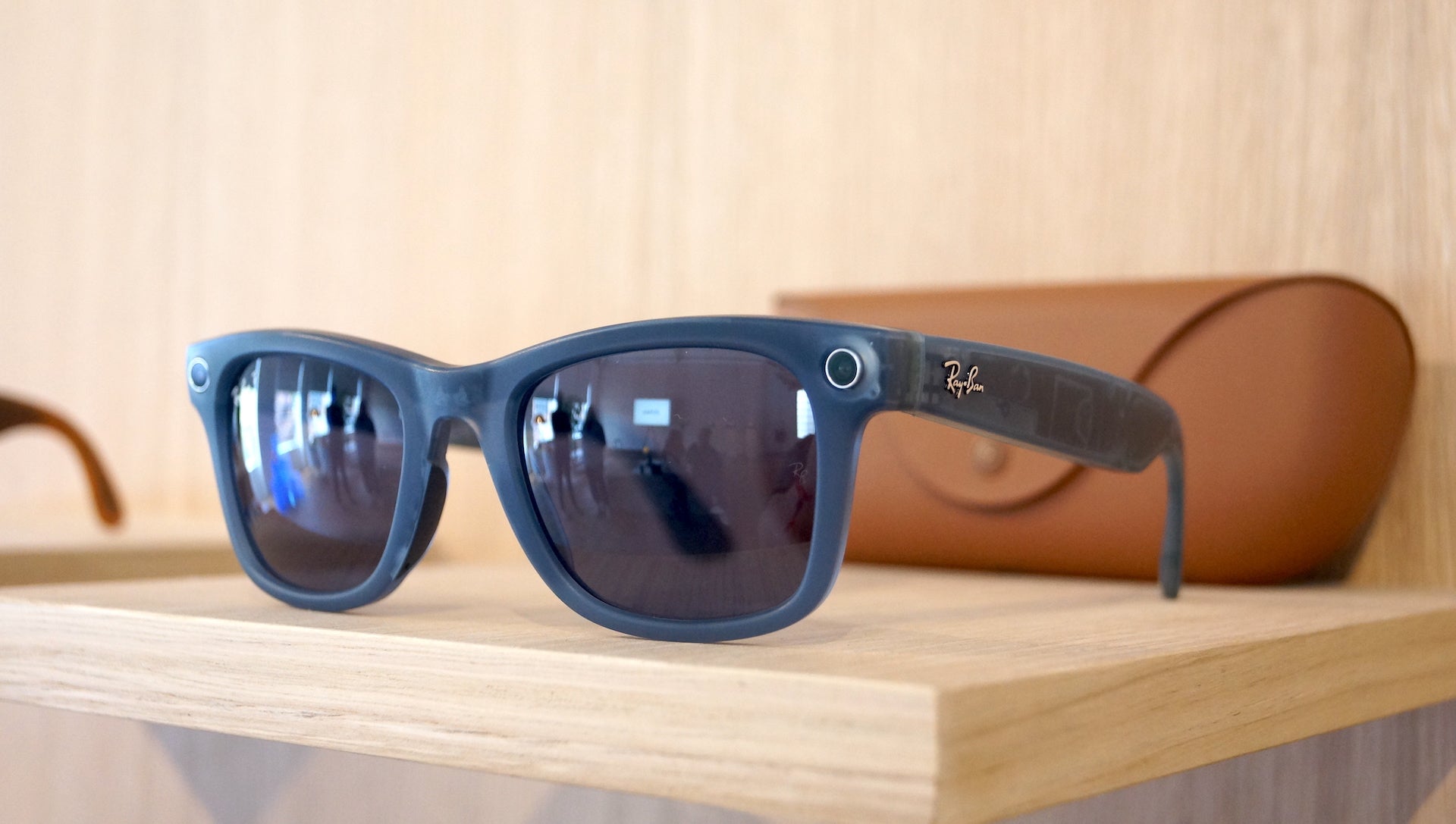
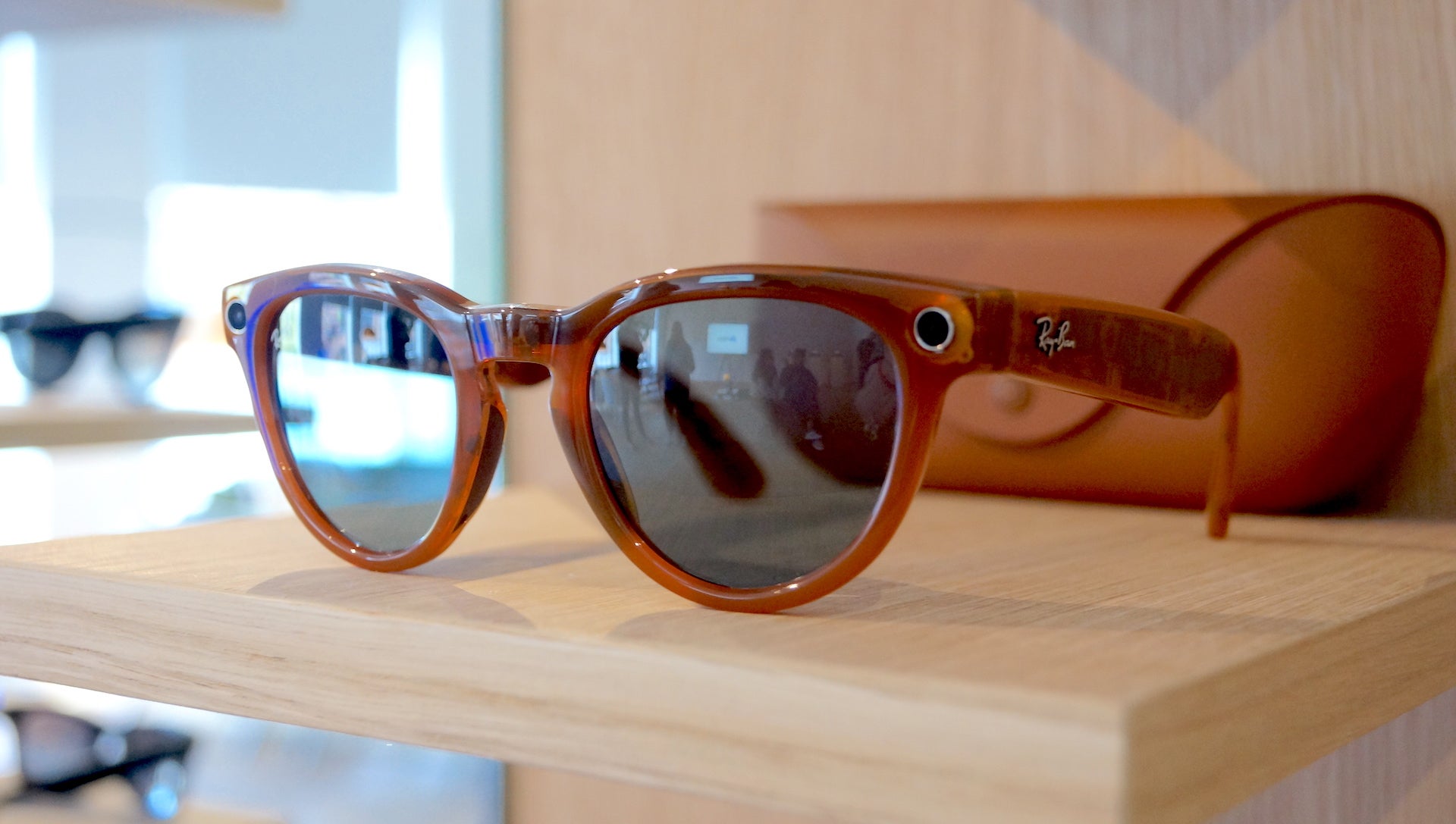
Regardless of the finish you get, you’ll find all the stapes of Ray-Ban design, including the signature logo on the arms of the frame and the lenses themselves. There’s also a new Wayfarer Large size this time around to help accommodate more head sizes than its comparatively narrow predecessor.
There’s a new stylish semi-transparent finish that shows off the techy internals of the glasses, available in both Caramel and Jeans finishes, along with the signature Revel Black colourway in both shiny and matte finishes. Combined with a range of lens options – including transition lenses – available via the Ray-Ban Remix online storefront, there are over 150 potential combinations.
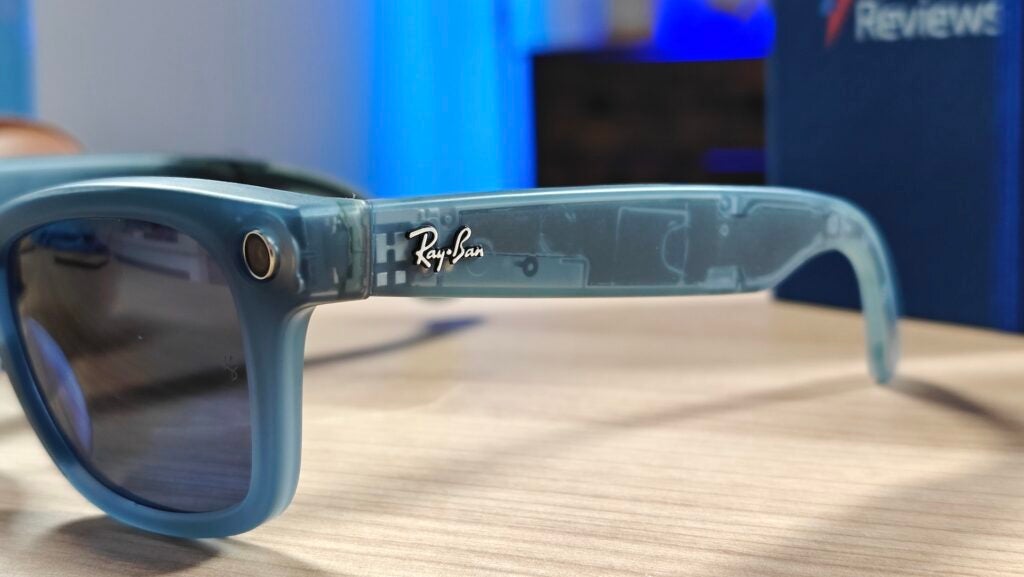
The first thing I noticed when donning the new specs was just how much more comfortable they are compared to the Ray-Ban Stories, which I found would pinch the head, particularly behind the ears, with very little give in the arms. For context, I opted for the new Wayfarer Large finish.
The frame is much less rigid this time, with enough give to cater for more head sizes and slowly mould to the shape of your head as regular sunglasses do. There is less pressure on the bridge of my nose compared to the first-gen specs too, with a more balanced weight distribution.
In fact, I’ve worn them for 6+ hours on more than one occasion with nary a complaint about comfort, and that’s pretty rare for smart glasses, which are notoriously bulky and uncomfortable. The arms of the glasses are still a little chunkier than their non-smart counterparts, but this isn’t that noticeable when worn.
Just as important as comfort is durability, and with the Ray-Ban Meta Glasses boasting IPX4 splash resistance, you don’t need to take them off when it starts raining – although I’d still avoid completely submerging the frames.
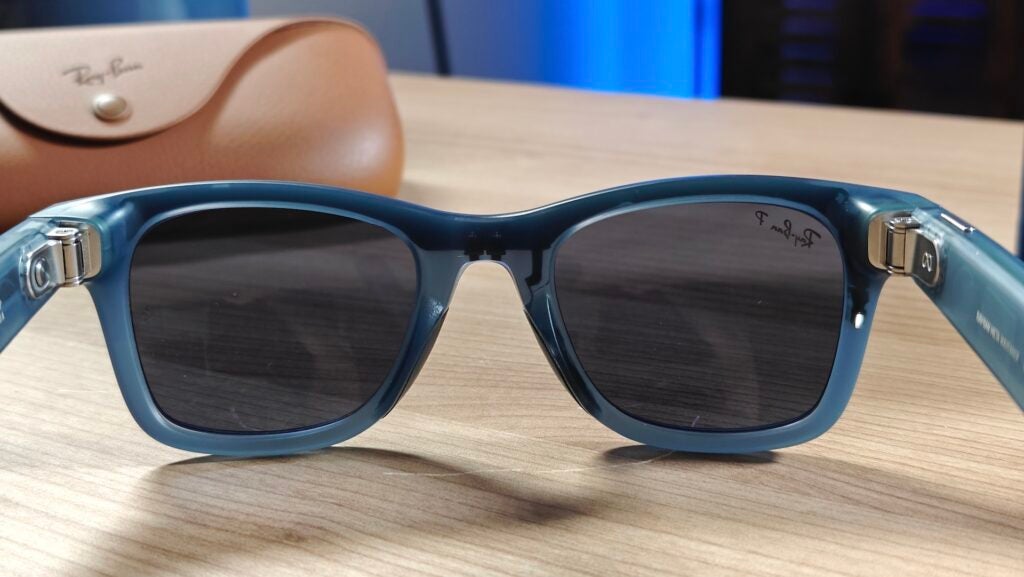
Features
- Improved virtual assistant capabilities
- 32GB of onboard storage
- Impressive integration with Meta apps
The Ray-Ban Meta Glasses can do much more than snap a quick photo or play some of your favourite tunes. With the five built-in mics, up from three in its predecessor, you can make and receive calls using the glasses, with decent background noise reduction that allowed the recipient of several calls to hear me clearly.
Quality only deteriorated when I was on a call on a busy main road in London with buses, vans and cars constantly driving past, but that’s a challenging scenario that even the best earbuds on the market will struggle to cancel out.
Meta has also further developed its virtual assistant compared to the first-gen Stories, allowing for more complex instructions and better general knowledge responses.
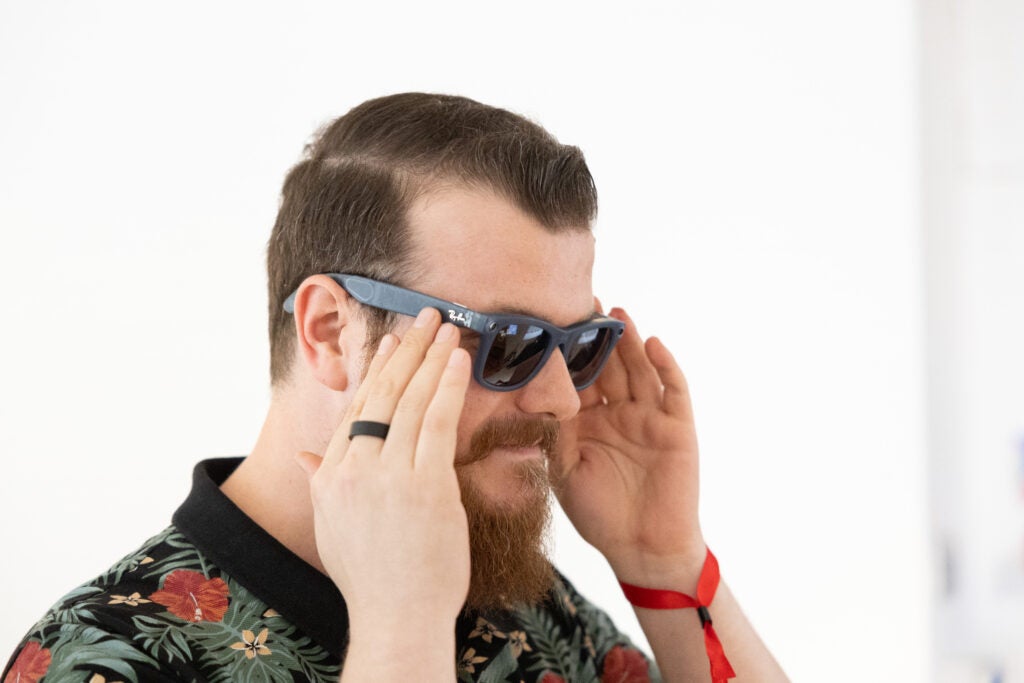
By saying ‘Hey Meta’, you can use the assistant to not only take a photo, but with improved integration with Meta-owned apps like WhatsApp, Facebook, Messenger, Instagram and Threads, you can also share it with specific contacts without first having to import the image to your phone.
It all works in the background after a quick setup on the redesigned Meta View app, available for both iOS and Android devices. I used it to send quick snaps to my other half via WhatsApp, and I’ve even made WhatsApp audio calls from the headset without reaching for my phone.
That tight integration with Meta services also allows you to use the smart glasses for livestreaming on Instagram and Facebook, with users able to seamlessly switch between the phone camera and POV-style glasses cam with a double-press of the side-mounted button. It’s a real boon for creators, providing hands-free POV action for performances and tutorials.
The built-in virtual assistant is still hamstrung by supporting only Meta apps and not third-party apps like TikTok and Snapchat, but it’s an interesting insight into the direction Meta wants to take its smart specs in.

The 32GB of onboard storage should be enough to capture 8x more photos and videos – around 500 photos and 100 videos – before you hit full storage. That’ll be more than enough for most, and with a quick sync of the Meta View app for iOS and Android, you’re free to continue snapping away to your heart’s content.
That’s the idea anyway; in reality, the app doesn’t always work as smoothly as advertised. There have been multiple occasions in my month of use where, despite the fact the glasses are connected via Bluetooth, they haven’t been recognised by the app, leaving me unable to import the photos and videos I’d just taken.
This was usually remedied by a combination of force-closing the app and restarting the glasses, but it was frustrating at times. Thankfully minor issues like these should hopefully be ironed out pretty quickly, but if you’re looking to get a pair right now, it’s certainly worth bearing in mind.
Cameras
- Upgraded 12MP ultrawide camera
- Impressive performance in well-lit environments
- Bigger, brighter recording LED
The camera within the Ray-Ban Meta Glasses has seen a considerable upgrade compared to the first-gen smart specs, up from 4MP to a 12MP lens, but it works similarly with a press or hold of the arm-mounted button to take a photo or a video respectively.
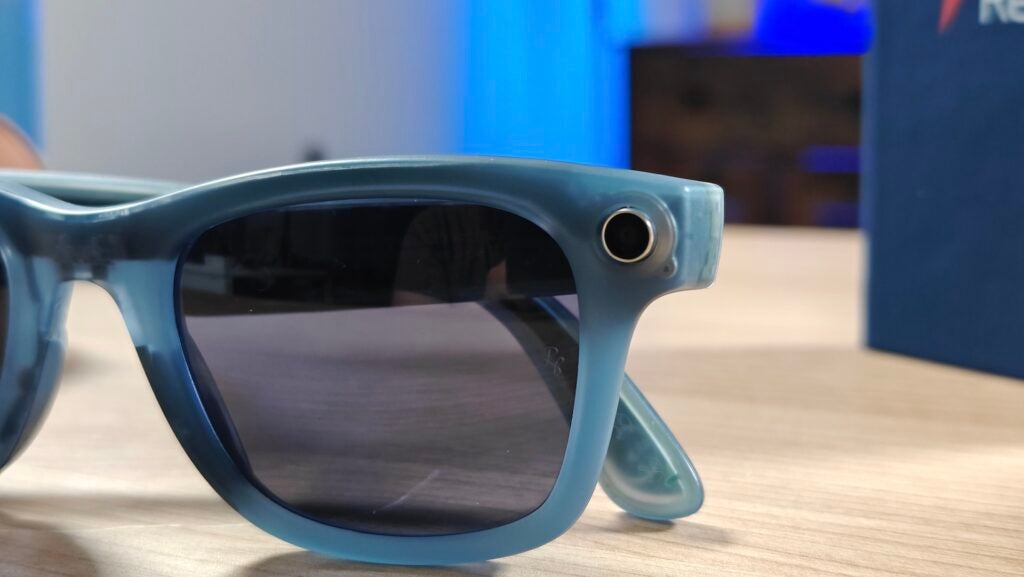
Though the images captured by the Ray-Ban Stories were decent, they pale in comparison to the quality of snaps from the Ray-Ban Meta Glasses. Images I captured during a recent trip to Hawaii were nothing short of stunning – and I’m not just talking about the scenery.



Such photos were absolutely packed with detail, vibrant colours and impressive dynamic range, even in shots where the sun was clearly visible in the sky. There was the occasional blur if I took a photo when walking, however, so standing still for a second to snap pictures is definitely the way forward with these smart specs.

That performance doesn’t necessarily translate to low-light environments, with more notable levels of noise and a slightly soft look in places, but there’s only so much you can do with such a tiny camera sensor.

That said, the lens does boast improved electronic image stabilisation to deliver smoother video. That should, in theory, allow you to record relatively stable videos when running or playing football. I can’t attest to that, having not gone for a run in the past two years (yes, I know!), but it was enough to turn a walk along a sea path into a sweeping vista that was pretty shake-free.
There are still the occasional moments where videos shudder, but unless you’re wearing them doing extreme sports or something of the like, you don’t really have much to worry about.
There’s also a boosted five microphones, up from three, to not only deliver better audio for hands-free calling but 3D-like audio capture when recording videos – a cool feature that you can’t easily get from most smartphone setups.
It essentially captures sound from the mics on the left and right of the glasses independently for a cool binaural effect, meaning sounds you heard from behind your left shoulder in the moment will also come from behind your left shoulder when watching videos back with headphones. It’s a neat trick that lends itself well to the form factor.
This all culminates in impressive video recording capabilities. As with photos, it’s much better in bright conditions than in dark evening environments, but as long as there’s plenty of light, there’s very little to complain about.
The stabilisation works as promised most of the time, delivering smooth, crisp 1080p video with impressive dynamic range and plenty of detail from your point of view, adding a more personal touch to the videos you capture.
Privacy is a huge factor when wearing a discreet camera on your face, which is why the LED light is bigger and brighter than its predecessor to make it obvious to those around you when you’re recording or snapping a photo.
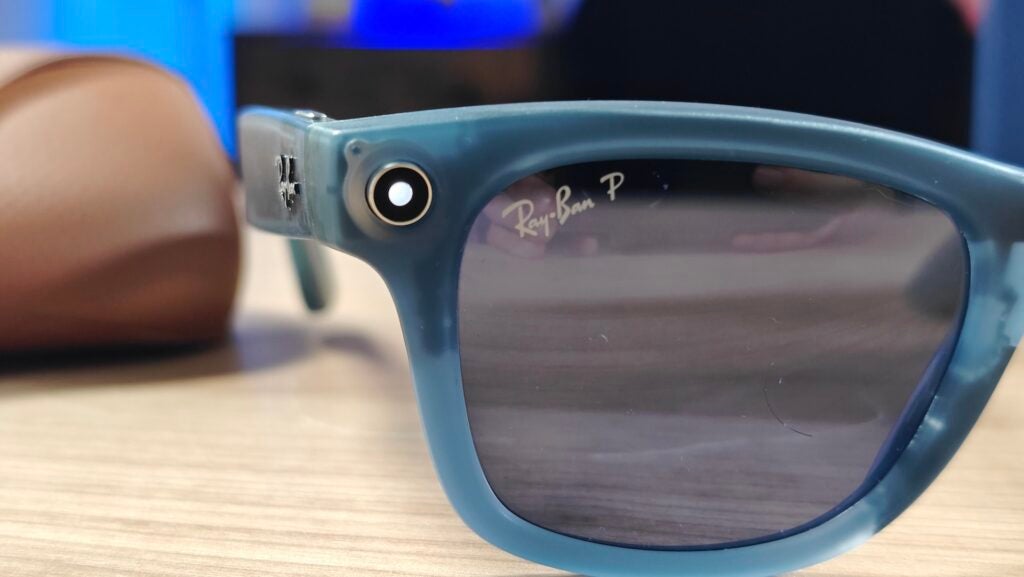
Moreover, a hidden depth sensor can tell if someone is trying to cover the LED with tape, and it won’t record or take photos until it’s removed. That should help alleviate some of that potential awkwardness that those around you might feel when you’re wearing the smart specs.
Audio
- Louder, bassier audio output
- New auto play/pause tech
- Reduced noise leakage
Audio performance is another area where the Ray-Ban Meta Glasses excel.
Compared to the Ray-Ban Stories, I found the audio to be not only louder (Meta claims up to 50% louder) but fuller with more notable levels of bass. It still falls wide of the mark for proper headphone-level bass performance – an experience that open-ear speakers like these’ll never replicate – but as long as you’re not listening to bass-heavy Dubstep, it doesn’t detract too much from the experience.
It’s undoubtedly passable for casual music listening when walking the streets or getting directions from Google Maps, while still being able to clearly hear the environment around you. It also means you can watch TikToks, YouTube videos and anything else in public without disturbing those around you.

That said, sound leakage is less of a problem this time, with an improved design that minimises how much those around you can hear – especially compared to similarly priced alternatives like the Huawei Eyewear 2 that are clearly heard, even at relatively low volumes.
Don’t get me wrong, those around me still heard the telltale whispers of music when listening above the 70-80% mark, but at more comfortable levels (around the 50% mark) it was barely audible to those sitting nearby in a quiet office environment.
There’s also a new sensor within the smart glasses that can detect when they’re worn and when they’re taken off to play and pause audio output accordingly, and as with its predecessor, you can control volume and playback by tapping and swiping the right arm of the glasses.
Battery life
- Redesigned charging case
- Stylish, compact design
- Holds up to 8 recharges
Charging the first-gen Ray-Ban Stories was a bit of a headache with a bulky case and hit-and-miss connection points, so it’s great to see the two companies take it more seriously with the newer smart glasses.
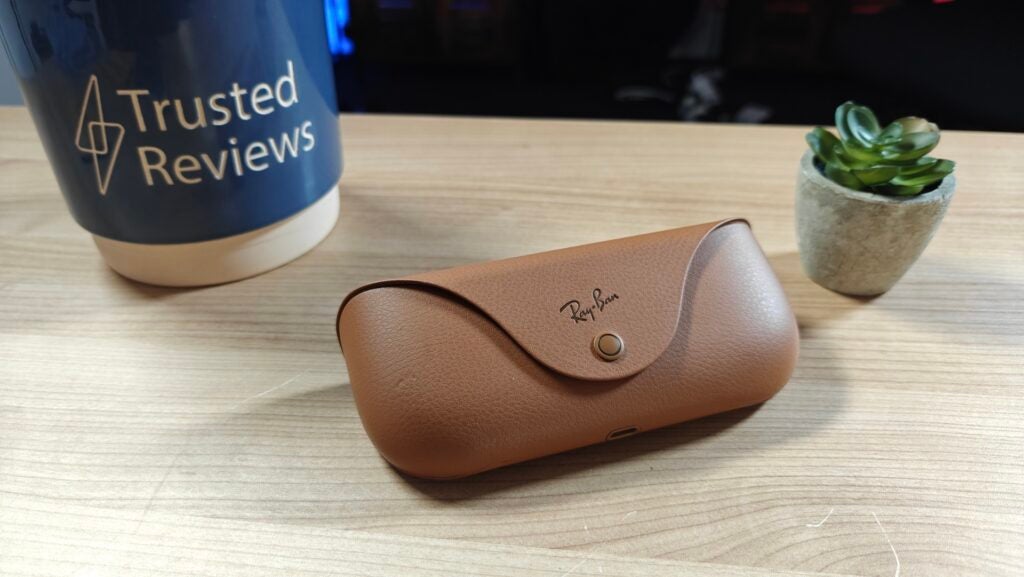
First off, the new case is much smaller and lighter than the comparatively chunky case of the first-gen smart glasses. It’s also a completely different style, sporting a similar design to that of Ray-Ban’s regular glasses, complete with a tanned leather finish that helps sell the premium nature of the specs.
Despite this, the case can hold more charges than its predecessor, with the newer case able to provide eight charges before needing a top-up, up from just three recharges. There’s even an excellent LED light disguised as a regular button that’ll change colour depending on how much battery life remains.
The contact points on the glasses points have also moved from the stems to the bridge of the glasses, which provides a much more secure connection. It also allows for easier connection, as one of the biggest frustrations with the first-gen specs was getting them into the correct position for charging.
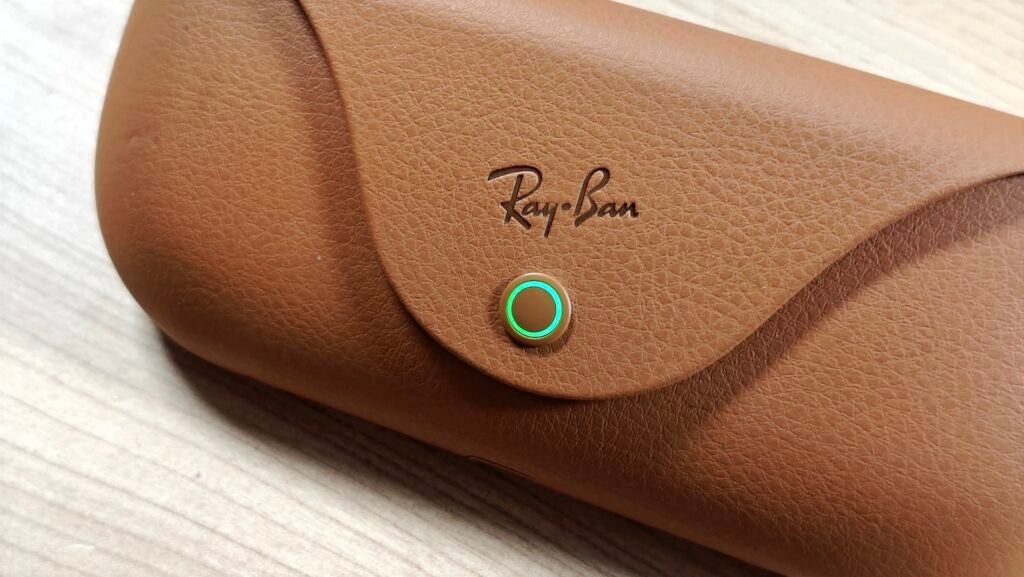
Both the glasses and case are smarter this time, too. The case can now stop charging the glasses once they reach 100%, and the glasses automatically power off after a few minutes of inactivity.
Meta claims six hours of mixed-use per charge, which is a significant improvement on the original specs, but that’s not always going to be the case. One particular afternoon, I used the Ray-Ban Meta Glasses to constantly listen to music while taking the occasional photo and video and only managed to get around 4.5 hours of use before they ran out of charge.
However, on the other end of the spectrum, I’ve had days where I’ve gone over the six-hour mark while casually snapping away – it really does depend on how you’re using the glasses.
Latest deals
Should you buy it?
You want a premium smart glasses experience
From the quality of the audio to the photos taken and even the style, the Ray-Ban Meta Glasses are top-notch.
You want a built-in display in your glasses
While these specs are certainly smart, they don’t include small displays to watch movies.
Final Thoughts
The Ray-Ban Meta Glasses may not be the AR-equipped specs of tomorrow, but they offer a unique way to capture precious moments from your POV without needing to reach without a smartphone – and with impressive detail and clarity, even in challenging daylight scenarios.
The audio and five built-in mics further boost the experience with the ability to listen to music and even take calls, and with improvements to Meta’s onboard AI, you can do much more without touching either your phone or the specs.
There’s also the fact that these are stylish Ray-Ban specs available in both the iconic Wayfarer finish and a new Headliner finish, making them an instant style hit compared to other techy specs.
Sure, they’re a niche product, but in a sea of half-assed smart glasses, the Ray-Ban Meta Glasses stand out as one of the few truly premium options that largely delivers on its promise.
How we test
When testing a pair of smart glasses, we thoroughly test all the available features, be that audio, camera tech or even smart displays, evaluating various aspects like performance, battery life and comfort.
Used for over a month before review
Took a lot of photos and videos
Used in multiple ways to test battery life
FAQs
With IPX4 water resistance, they’ll survive a stint in the rain, but you might want to be careful if you go to the beach.
Absolutely – you can add a prescription and other options when customising the glasses on the Ray-Ban website.



